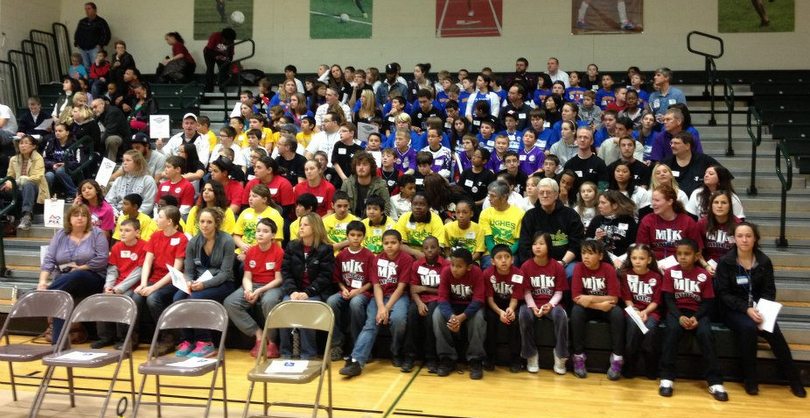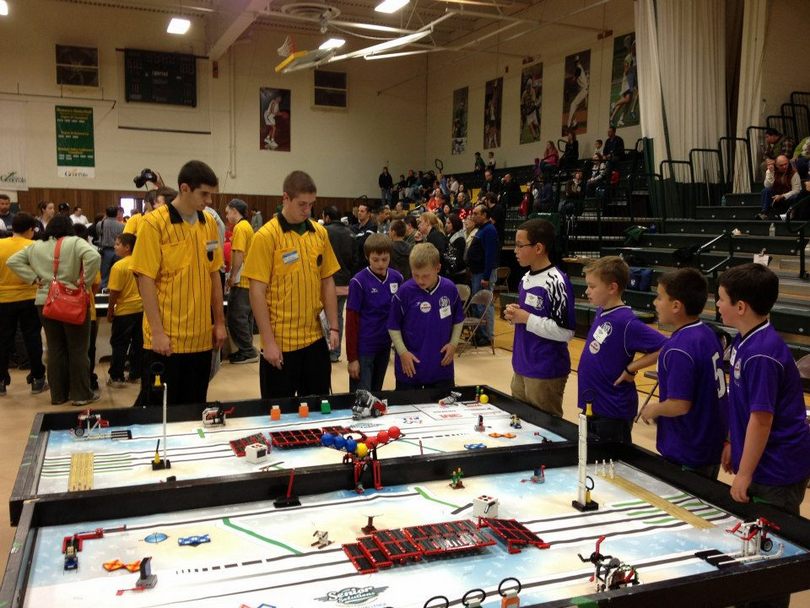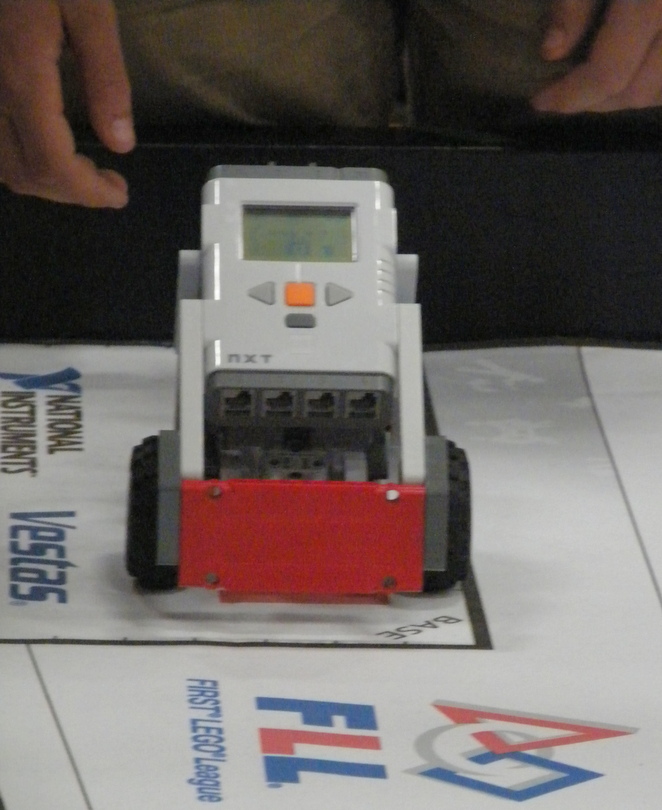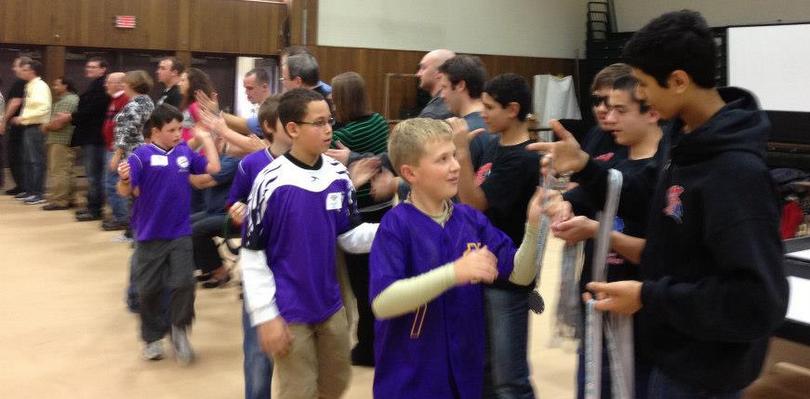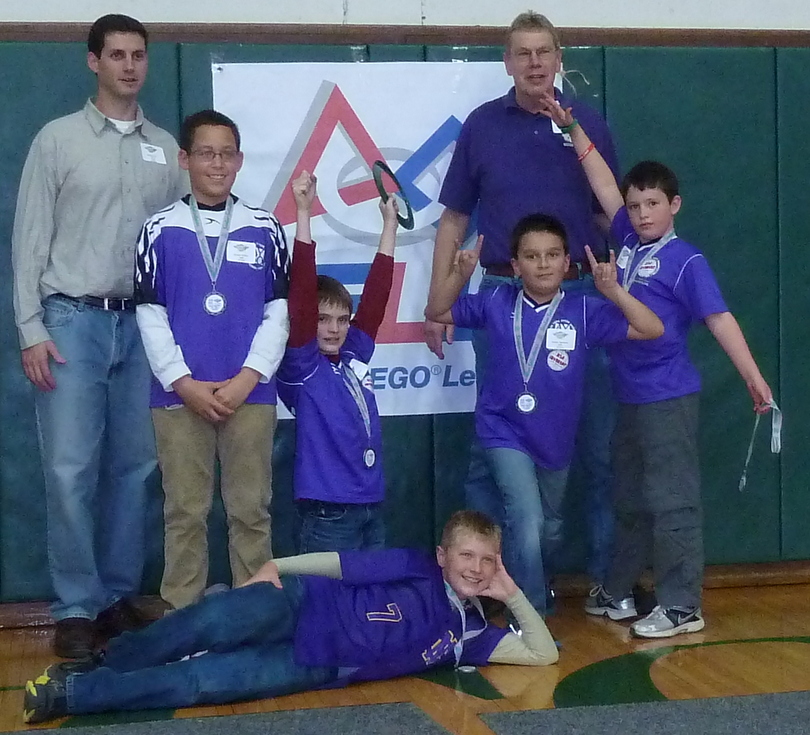Unfortunately the HP Bolts did not advance past the HCCC Qualifying Tournament to the First Lego League Championship Tournament at SUNYIT December 1. I thought I would share with you some of the grading and comments our FLL team received from the judges. Our final grade was compiled from three judged sessions: Core Values, Research Project, and Robot Design; and the best score from three attempted timed runs of robot. As coaches we were permitted to listen to the Core Values and Research Project Sessions. We were not permitted to listen to the Robot Design session.
For the judged sessions there were multiple judges contributing to a score sheet which reported one of four grades: Beginning, Developing Accomplished and Exemplary; from low to high for various items.
For our judged CORE VALUES session the received extra points for our team introduction (team name and participants) and favorable comments for
- very good explanation of core values that were most important
- very good at solving problems and comprising, taking turns
- “simple is better”
|
Item |
Grade |
| Discovery | Developing: emphasis on two aspects, one is neglected |
| Team Spirit | Accomplished: team is enthusiastic and fun, clear identity |
| Integration | Exemplary: team is able to describe multiple examples including individual stories. |
| Effectiveness | Exemplary: clear processes enable the team to accomplish well defined goals. |
| Efficiency | Accomplished: excellent time management and role definition allows the team to accomplish most goals. |
| Kids do the work | Exemplary: team independence with minimal coach guidance. |
| Inclusion | Exemplary: balanced team involvement and appreciation for contributions of all team members |
| Respect | Exemplary: always evident, even in difficult situations and team actively helps other teams. |
These were excellent scores. We were really pleased with the presentation as all the boys contributed thoughts. They helped one another in the problem solving discussion which involved picking a random playing card from deck and relating it to their team and/or FLL experience.
For our judged RESEACH PROJECT session we received the following comments:
- Make sure to mention all research, good resources
- Great idea for making life easier for seniors
- Great introduction, poised, delivery + presentation = wonderful J
|
Item |
Grade |
| Problem Identification | Exemplary: clear very detailed |
| Sources of Information | Developing: two types of information cites; several sources |
| Problem Analysis | Accomplished: sufficient study and analysis by team. |
| Review Existing Solutions | Developing: minimal review: some team analysis |
| Team Solution | Exemplary: easy to understand by all |
| Innovation | Exemplary: original solution/application with the potential to add significant value |
| Implementation | Accomplished: factors well considered: some question about proposed solution |
| Sharing | Exemplary: shared with multiple individuals or groups that might benefit |
| Creativity | Accomplished: engaging and imaginative |
| Presentation Effectiveness | Exemplary: clear and well organized. |
We felt the judges really like the way the boys took control of the session. They introduced the team, themselves, their skit and their role in the skit. I believe the judges found the skit to be a good introduction to both the need and the proposed solution. We could have done a little better citing research sources, but since this was basically put together by the two 4th graders – it was pretty impressive.
For our ROBOT PERFORMANCE we finished in a remarkable 9th place out of 20 teams. Remarkable in that our robot rarely performed as anticipated; our 1st run no missions worked. We finished with a high score of 135. I believe the highest placing team scored 255 points. The team in 10th place below us scored 115 points.
We did not properly prepare for and/or practice with the time, noise, performance pressures and intensity which our robot team were subjected to. Credit goes to the boys for pulling together and working it out as a team despite the frustration they experienced.
Our ROBOT DESIGN was our weakest component. We knew that going in.
- Our robot required major re-building twice due to our inability to re-construct a straight forward design.
- We were unable to incorporate any sensors into our missions.
- All of our movement decisions were based on dead reckoning
For our judged ROBOT DESIGN session we received the following comments:
- Bring the entire robot to all judging sessions
- Good teamwork
- Consider using sensor in future designs.
We received 7 Beginning grades in the categories of Durability, Programming Quality, Programming Efficiency, Automation/Navigation, Design Process, Mission Strategy, and Innovation. We received 2 Developing grades for Mechanical Efficiency and Mechanization.
SUMMARY
Obviously the team wanted to be rewarded for their hard work by advancing to the next round at SUNYIT. We said we would go to the tournament if we could get one working mission. We ended up with three missions – although none were as polished as we would have liked. We felt good about our presentations of the research project and core values and the kids did great on those. The robot design was a ‘gotcha’ that got us and probably was the single factor that kept the team from advancing.
I got involved in this effort because my son went to the Intro to FLL summer class at SUNYIT and came out requesting more involvement. I encouraged his participation because I thought it was a good way for him to learn logic and programming; get exposed to sensors and basic mechanical automation. These are skills that I believe can be valuable in a future work force.
However, what I didn’t anticipate was the amount of teamwork, problem solving and communication lessons that my son and this team would be exposed to each and every time we got together. I have coached AYSO soccer and youth basketball for a number of years; I have been involved as a 4H leader and Sunday School teacher but none of those environments were as demanding of teamwork, problem solving and communication as this past few weeks of FLL experiences has been. The boys may have learned something about logic, programming, sensors and basic mechanical automation but I absolutely am sure they learned something about teamwork, problem solving and communication – which are equally important in a future work force.
This is a great bunch of kids to work with. It is really fun to work as part of a motivated team – which these boys became as the weeks went on. I wish to convey my thanks to all of them for their contributions to this team. I look forward to seeing them in the future.

